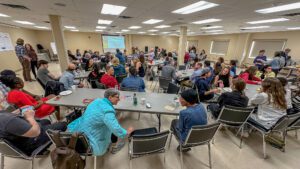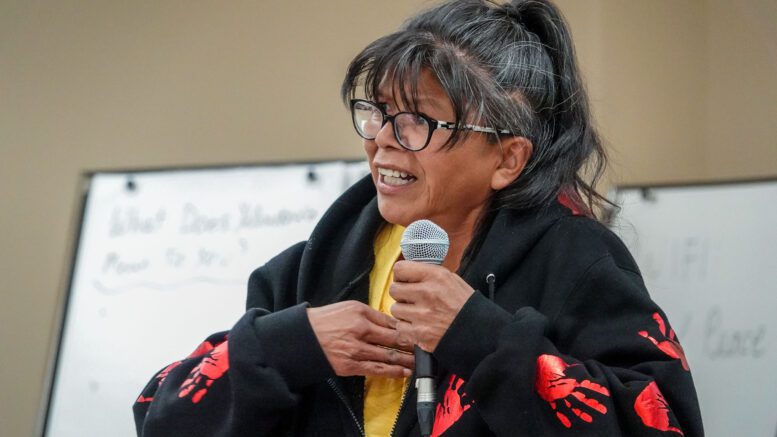More homeless encampments could be popping up in Yellowknife, as city officials are in discussions with their GNWT counterparts over how to handle the increased number of street-involved people here this summer.
There are already tents in clusters on the west loop of the Frame Lake Trail and a large wooden camping platform has been erected on commissioner’s land opposite the entrance to the upscale Niven Lake neighbourhood.
While Yellowknife Mayor Rebecca Alty maintained the policy direction was “still to be determined,” she told CKLB she isn’t against the idea.

Mayor Rebecca Alty at Wednesday night’s Homeless Roundtable at the Tree of Peace in Yellowknife. (James O’Connor/CKLB)
“There are discussions with the territorial government, since the first tent platform has been set up on commissioners lands. So, we will have to see how that that can go and what can what that can look like.”
Alty was speaking to the media in advance of a facilitated Homeless Roundtable organized by the City to gather ideas about how to help the swollen number of underhoused, who are having difficulties finding sleeping spaces in shelters.
However, the roundtable was held just hours after Yellowknife RCMP learned a woman had just escaped from a tent where she had been held against her will for the past week and assaulted by a male suspect with a weapon.
A 47-year-old suspect was arrested. The exact location of the tent was withheld and it’s unknown if the tent was his primary residence.
Georgina Frankie, one of the founders of the 48th Street encampment, said it mimics other informal campsites found across Canada.
“Every major city has a tent encampment, and I don’t see why we don’t have a tent encampment, and there are 200 homeless still missing when city evacuated during the wildfire last year.
“So homeless, they’re not here. You’re speaking on their behalf. You know what they go through. They were intimidated to come here.
“We need tents. We need blankets. We need canvas tents. That’s what we’re trying to do. If you guys are able to help us on all government levels, find a tent place where they’re safe. They need to be safe. There are targets. They are being murdered on your backyard. There are only 20,000 residents here (in Yellowknife). So, these are the kind of things that should be discussed.”
City officials across the country have different policies when it comes to homeless encampments. Some tolerate them for a while, but tear them down when complaints about crime and other safety concerns rise in volume.

Approximately 100 people attended a Homeless Roundtable at the Tree of Peace in Yellowknife. (James O’Connor/CKLB)
Such as in Fort McMurray last summer. A tent city was dismantled by municipal workers, as social organizations worked to find homes for the campers. Fort McMurray Today reported complaints ranged from fights, mental health episodes, drug and alcohol abuse, public urination and defecation, and fires.
The Federal Housing Advocate’s review of homeless encampments found them to be not a safe or sustainable solution for housing. The report stated that, “For people living in these encampments, every day is a matter of life and death.”
The Federal Housing Advocate in February called for the end of forced evictions of encampments, particularly on public lands, as it is a violation of Canadian Charter of Rights and the United Nations Declaration on the Rights of Indigenous Peoples.
The advocate stated that First Nations, Inuit and Métis governments and representative organizations must be fully supported to develop and provide self-determined, culturally appropriate housing and related services and supports, including supports in urban centres.
Another woman who identified herself as Tina said the key is to address inter-generational trauma, which leads to homelessness, substance abuse and interactions with police.
“We need to learn about the trauma, the mental illness, children lost in the system. We want to break the cycle, help the parents. Help the parents to take care of themselves in order to fight for their children, so their children won’t be homeless. That’s what we’re facing, because all our drug dealers are taking over our children, our grandchildren’s home, and nobody’s talking about it because we’re afraid, and the other things, most of the homelessness, they came from prison.
“I was homeless. I’m a day school survivor. Give me back a give me back my piece of land so I could make an indigenous healing centre for my people.”
Mayor Alty said a report will be generated by the consultants who hosted the roundtable.





